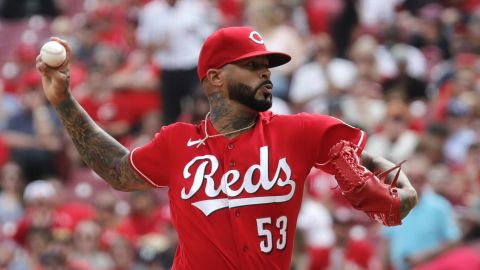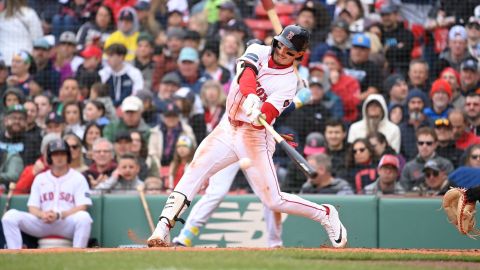 BOSTON — Just how it was drawn up.
BOSTON — Just how it was drawn up.
OK, not exactly. But despite the Red Sox’ shortcomings in the ALCS, they are advancing to the World Series because they exploited the Tigers’ weaknesses — or, perhaps more accurately, because the Tigers fell apart in areas in which Detroit was expected to crumble.
The Tigers entered the series with a distinct edge in starting pitching, and that area of Detroit’s game was fantastic. Tigers starting pitchers recorded 55 strikeouts in the six-game series — which marks a new record for any postseason series — and were simply dominant at times. The Red Sox couldn’t buy a hit in the first three games of the ALCS despite jumping out to a 2-1 series lead.
But for as much praise as the Tigers’ deep starting rotation received before the series, there were some obvious concerns in other areas for Detroit. The Red Sox held a clear-cut edge in the three B’s and D: bullpen, bench, baserunning and defense. All played a major role in the Red Sox locking up the American League pennant.
The Tigers’ bullpen ranked 24th in ERA, 23rd in WHIP and 23rd in walks per nine innings during the regular season, so it was clear that if the Red Sox could drive up the starters’ pitch counts, there was the potential for Boston to do damage in the later innings. The Red Sox, of course, smacked two grand slams off Tigers relievers in the series, so, in some ways, that particular mission was accomplished.
David Ortiz ripped a game-tying grand slam into the Red Sox’ bullpen off Joaquin Benoit in the eighth inning of Game 2, and Shane Victorino lifted a go-ahead grand slam into the Monster seats off Jose Veras in the seventh inning of Game 6. The Red Sox became the first team in MLB history to hit two game-tying or go-ahead grand slams in the seventh inning or later in a single postseason, and just the sixth team ever to hit multiple grand slams in a single postseason series. Obviously, it’s tough to foresee two blasts of that magnitude, but it was reasonable to expect some struggles from the Tigers’ suspect bullpen.
The Red Sox’ bullpen, meanwhile, was tremendous. Koji Uehara was named the ALCS MVP for tossing six scoreless innings and earning three saves, but he was hardly the only reliever to produce. Both Junichi Tazawa and Craig Breslow recorded big outs in the series, and Brandon Workman stepped up in Games 2 and 6.
“The way I would sum it up is that I thought their starters were good. I thought their bullpen was great,” Tigers manager Jim Leyland said after Game 6. “I certainly don’t want to sound like I’m taking anything away from their starters, because I’m not. I thought their starters were good. I thought their bullpen was great.”
As for the benches, the Red Sox undoubtedly made better use of their resources. John Farrell decided to go exclusively with Jonny Gomes in left field because of the intangibles he brings, and Xander Bogaerts immediately made an impact upon joining the Red Sox’ starting lineup before Game 5. The Tigers, on the other hand, didn’t receive much bench production, mainly because it’s a thin unit.
For a baserunning snapshot, one mustn’t look any further than the sixth inning of Game 6. The Tigers were poised for a big inning after Victor Martinez gave the Tigers a 2-1 lead with a wall-ball single. They had runners at first and third with nobody out and Peralta digging in. Prince Fielder, who was just horrendous all series, froze between third and home when Peralta grounded to second base, and the end result was a double play that helped the Red Sox minimize the damage.
Oh yeah, there was also Miguel Cabrera getting thrown out at home in the first inning of Game 5 and Austin Jackson getting picked off first base in the seventh inning of Game 6 — to name a couple of other poor baserunning plays by the Tigers.
The Red Sox remained aggressive on the bases throughout the entire series, and were much smarter and thus successful in their efforts. Whether it was Jacoby Ellsbury swiping bags, Will Middlebrooks going from first to third on a bunt in the ninth inning of Game 5 or Victorino and Dustin Pedroia moving up a station on a ball in the dirt that barely got away from Alex Avila in the sixth inning of Game 6, the Red Sox did everything they could to maximize their opportunities.
As far as defense is concerned, a glance at the two shortstops in Game 6 told you everything you needed to know. Stephen Drew made a diving stop on a ground ball up the middle to save a run in the top of the seventh inning, and the usually sure-handed Jose Iglesias made a costly error that helped pave the way for Victorino’s grand slam in the bottom half of the inning.
All of the little areas in which the Red Sox outpaced the Tigers helped set up the bigger, more emphatic blows, and ultimately helped Boston overcome Detroit’s star-studded cast.
“The difference really, when you look at the series, is they hit a couple of big bombs and we just didn’t quite do that,” Leyland said. “They hit a couple of timely — two or three timely — home runs. Big Papi [in Game 2] and Victorino tonight.”
The ALCS was a hard-fought battle that easily could have gone the other way if the Tigers executed better in certain areas. They didn’t, though, and it was to be somewhat expected given how the two teams matched up.
Have a question for Ricky Doyle? Send it to him via Twitter at @TheRickyDoyle or send it here.




